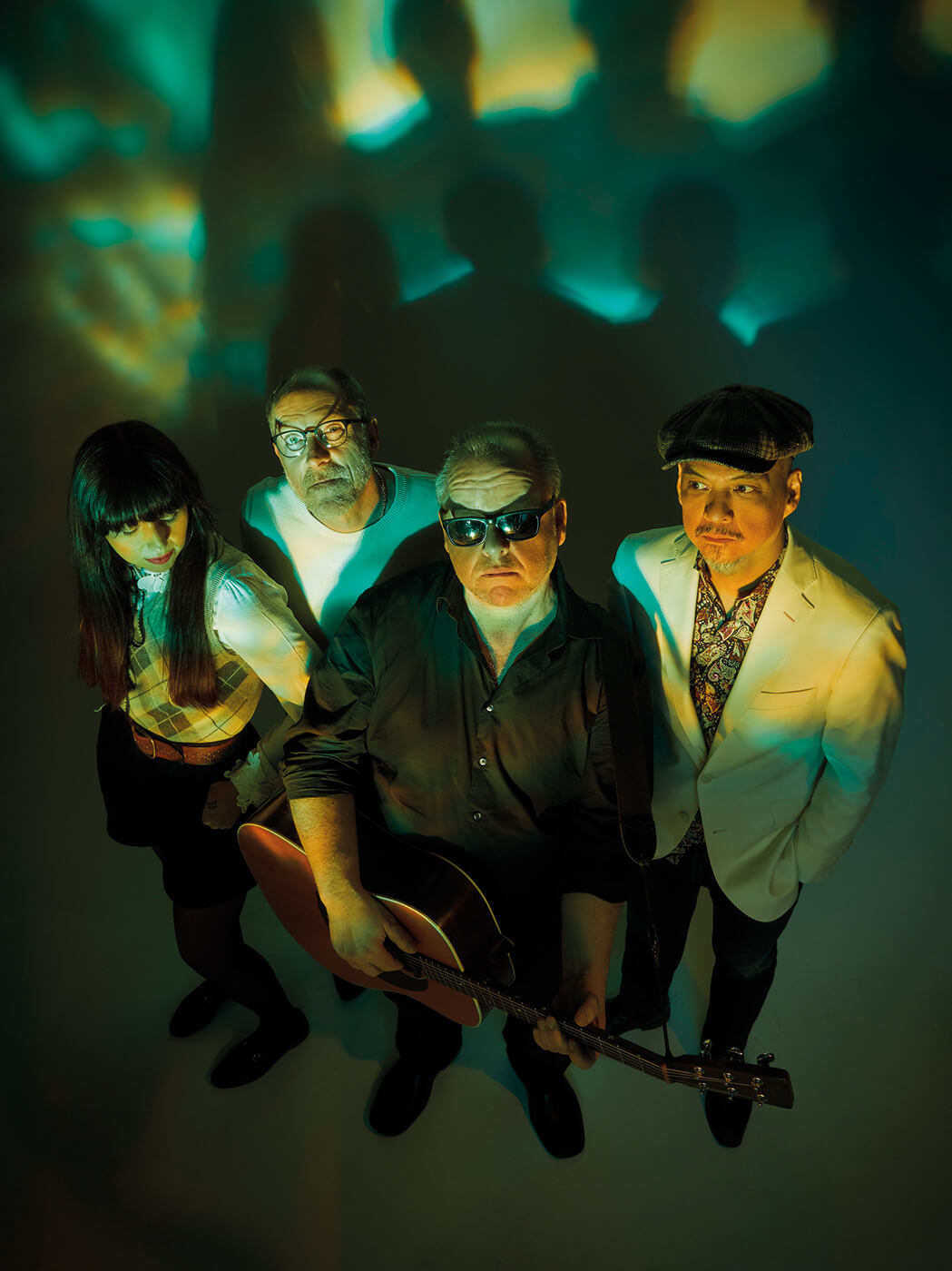Pixies’ Black Francis: “We’re just kind of shy and we don’t have a lot of dance moves, you know?”
The Pixies’ no-nonsense frontman and guitarist chats about their latest album Beneath The Eyrie, his love of Telecaster, and why vintage guitars make him a better player.
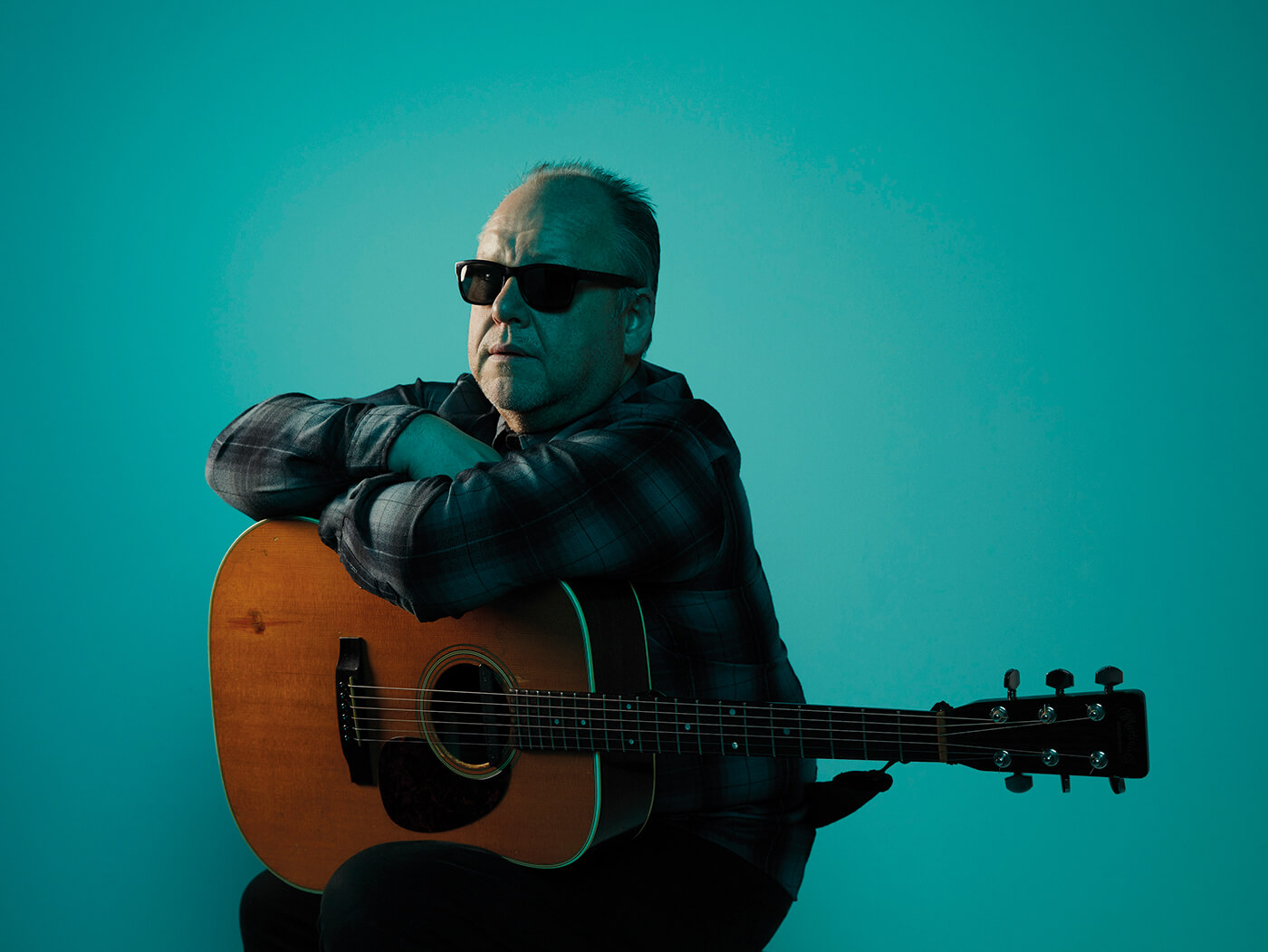
All images: Travis Shinn
Despite hailing from Boston, there’s something about Pixies that has always resonated a little deeper with British fans than back home – and it’s a connection that has endured through the decades. “You know, we don’t feel like we’re an English band… but all of our connections are here,” explains Charles Thompson IV, the man better known as Black Francis. “All the people that we work with closely tend to be English – our manager, our agent… even our road crew, they’re all from Manchester!”
Sat in the comfortable surrounds of a London hotel suite – with Francis smartly turned out in a black suit, black shirt and dark shades – it feels like the Pixies have come a long way from those early days. Does he ever worry that the band has drifted away from being the iconoclastic, angry college dropouts who tore the roof off small venues across this city in the late 80s?
“I don’t know that we even have that mindset anymore, we just do what we do at this point,” he shrugs. “It was more identifiable in 1986 as to what we didn’t want to sound like – the music that we were not into. And most of that was in the commercial realm.
“But having said that, within the indie world there’s probably a lot of music that’s also being pretentious, or being confrontational for the sake of being confrontational. There’s something about it that is not authentic – the word we’d use would be ’poser’. There’s a lot of posers on both sides of that fence, but it’s easier to throw darts at the commercial stuff. And I like confrontational performers, I think that they’re great! But it’s not really our personality to be confrontational. I guess what we do is more subversive…
“I suppose in a way, that’s how we kind of try to annoy the indie fans or other indie bands, by going and doing something that’s really popular!” Francis smirks.
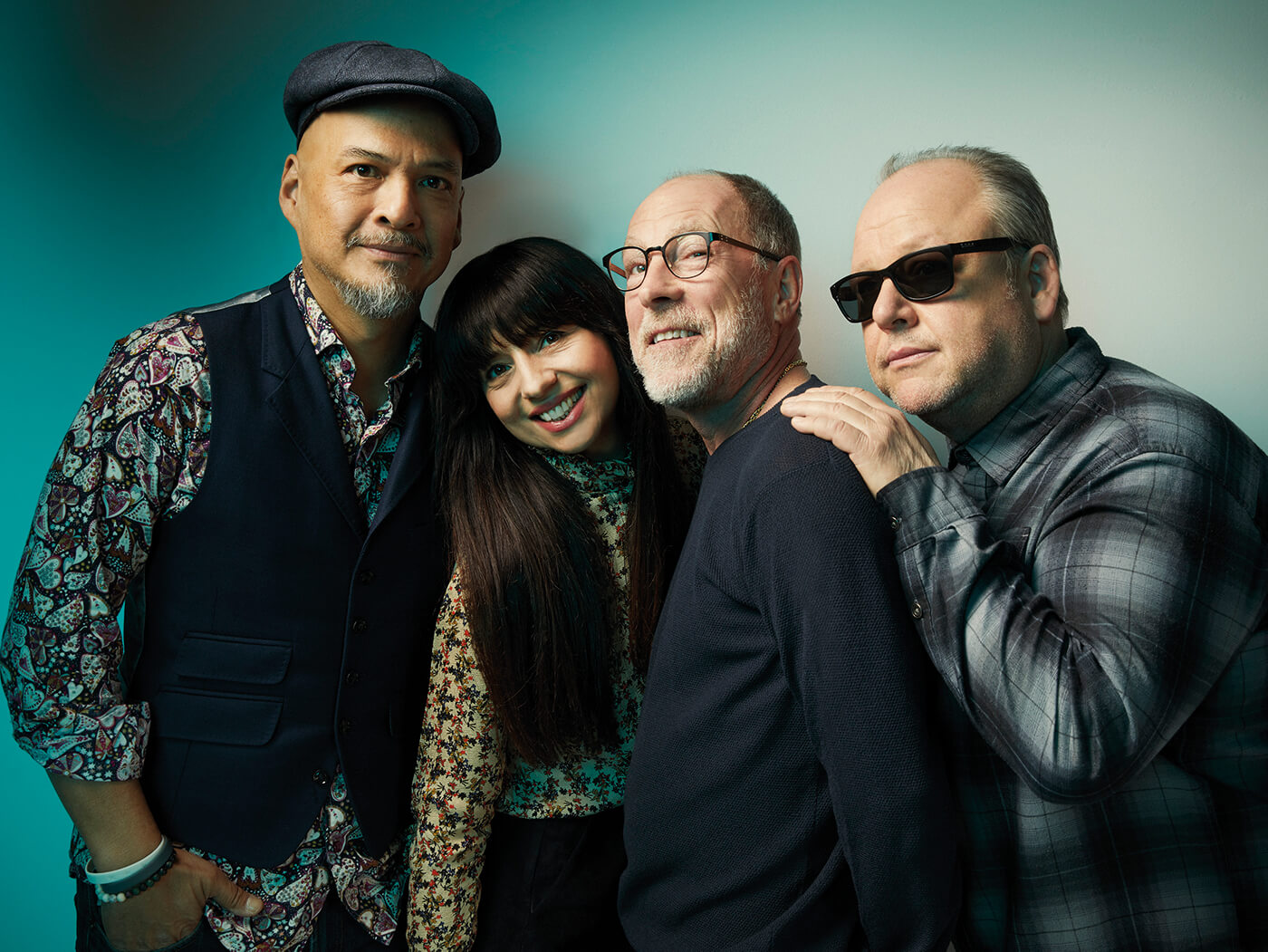
Working man
That last comment reflects a mindset that is a constant theme throughout our conversation – while he obviously takes his music very seriously, Black Francis is not one to eulogise or aggrandise it. In fact, when we mention the laundry list of huge bands who have publicly cited Pixies’ influence on their music – Nirvana, Radiohead, Weezer, Smashing Pumpkins and many others – his brow furrows, vexed.
“What are we going to do with that information?” he exclaims. “We all have egos, but we’re not going to sit around thinking about what our supposed ’legacy’ is. It’s kind of boring. I can’t really do anything creative with that information, personally. It doesn’t work like that for me.”
What creativity is for him, however, is good old-fashioned hard graft.
“That’s what it is. It’s work,” Francis says animatedly. “All artistic endeavour requires effort. It requires work. More than anything else – more than inspiration, more than influence, even more than aesthetic. For me, it just requires showing up and doing it. Talk to any painter, any photographer, any sculptor, any musician, any poet, any writer – it’s showing up! If you gotta do the thing, then you gotta do the thing. That’s really what it’s all about.
“It’s just setting up some drums, setting up some amps, singing into a microphone, trying to entertain the people that showed up. We’re good with bookings, y’know? ‘The gig’s on Friday,’ or whatever – whether it’s a performance or a recording session. ‘Well, I guess we need to get our ideas together!’ It’s not about ‘waiting for inspiration’, it’s about doing work.”
It’s a decidedly practical and blue-collar way of thinking about music, and we can’t help but wonder if that mindset has fed into the way that Pixies have always been a band that puts the music ahead of their personalities or ego on stage.
“I don’t even know if it’s that lofty, we’re just kind of shy and we don’t have a lot of dance moves, you know what I mean?” he deadpans. “So what can we do? Well, we can play a song at tempo. We can play various chords. We know we know how to make feedback. We know how to do surfy things. We know how to do funky things. We can inject a little bit of Americana or country into what we do. So there’s certain forms that we’re kind of comfortable with, and we use whatever vocabulary we have.”
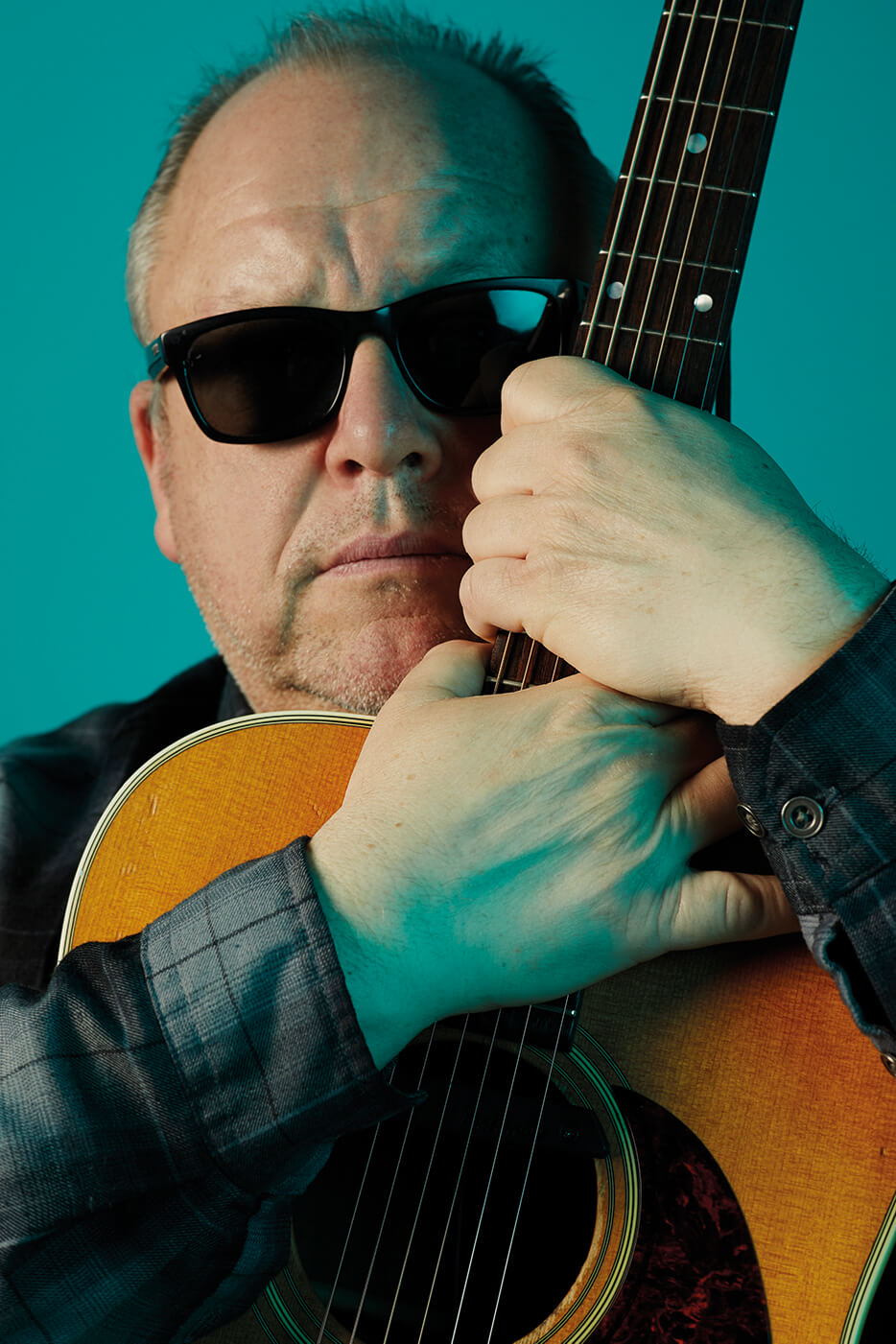
Surfin’ bird
That vocabulary has been getting more of a workout of late – despite getting back together to tour in 2004, it wasn’t until 2014’s Indie Cindy that the band returned as a full-fledged recording entity. Since then, founding bassist Kim Deal left the band, replaced by Paz Lenchantin, who made her debut on 2016’s Head Carrier – and now things continue apace with Pixies’ forthcoming seventh album, Beneath The Eyrie.
Given that the band seem to be very much into a record-making groove now, we have to ponder whether if that 23-year gap between albums was a result of some hesitancy on the band’s part to add to a canon that was so revered… and the answer is given typically short shrift.
“The thought might cross your mind, but we’re just talking about records here!” Francis chuckles. “We’re not that intimidated by the situation. So we just kind of got on with it. We’re not talking about saving the human race here – or at least not in a big way – you gotta have some balls!”
Last year saw the 30th anniversary of Pixies’ most beloved and influential album, Surfer Rosa. Listening to Beneath The Eyrie’s powerful dynamics, heavy use of acoustics and scuzzy edge, you’d be forgiven for thinking that revisiting Surfer Rosa on tour before recording this album had something of an impact.
“We even asked ourselves that question,” Frank admits. “But I can’t say that it’s something we dwelled on. It was sort of like, ’Oh, this is interesting, to play some of the songs we haven’t played a long time. I wonder if it will have an effect on our new songs? Okay… so what’s for dinner?’
“It always comes out the way that comes out. If you try to plan it out too much you’re just going to be disappointed, because things just never go as you think they’re going to go. We don’t really have a lot of ’artistic vision’, other than we don’t want to be boring.”
It should come as little surprise then, that the band didn’t waste too much time obsessing over concepts or themes that would dominate Beneath The Eyrie.
“It was suggested that maybe it would be a little bit Gothic… but the discussion was as long as that!” Frank laughs. “It all depends on what the song dictates as to where we go with it. We have no problem playing more abrasive or dissonant music, we have no problem playing really sweet pop music – we have no problem playing any kind of music, though we tend to gravitate to what we can do, as opposed to what we can’t!
If you try to plan it out too much you’re just going to be disappointed, because things just never go as you think they’re going to go
“We’re just reflecting back all the various things that we’ve heard, whatever we can get away with doing – whether it’s sounding like the Eagles or sounding like The Fall. They’re both valid.”
One of the most recognisable aspects of the Pixies’ music has been their stark, abrupt use of dynamics – the much-imitated ‘loud/quiet/loud’ – but even here, it’s something that Francis is keen to play down.
“We probably get a lot of credit for that, but that’s not something that we invented – there’s lots of music with dynamics!” he exclaims. “We learned pretty quickly that if everyone’s playing at the same time, it just sounds like a big mess, so it’s kind of like, ‘Well, how about if two of us don’t play right now?’
“We were in the rehearsal place, right back at the beginning and we were like, ‘Is this good?’ ‘I dunno, it’s kinda good.’ ‘How do we fix it?’ The first way you fix it is you start to eliminate things. And very quickly, you realise, ‘Oh, it sounds better now, because we made it simpler.’ And then when you first start to work with producers, they do that even more. So you realise, ‘Okay, less is more’. Until the moment you decide, ‘Everything has to play right now!’ and then it has to be dense!”
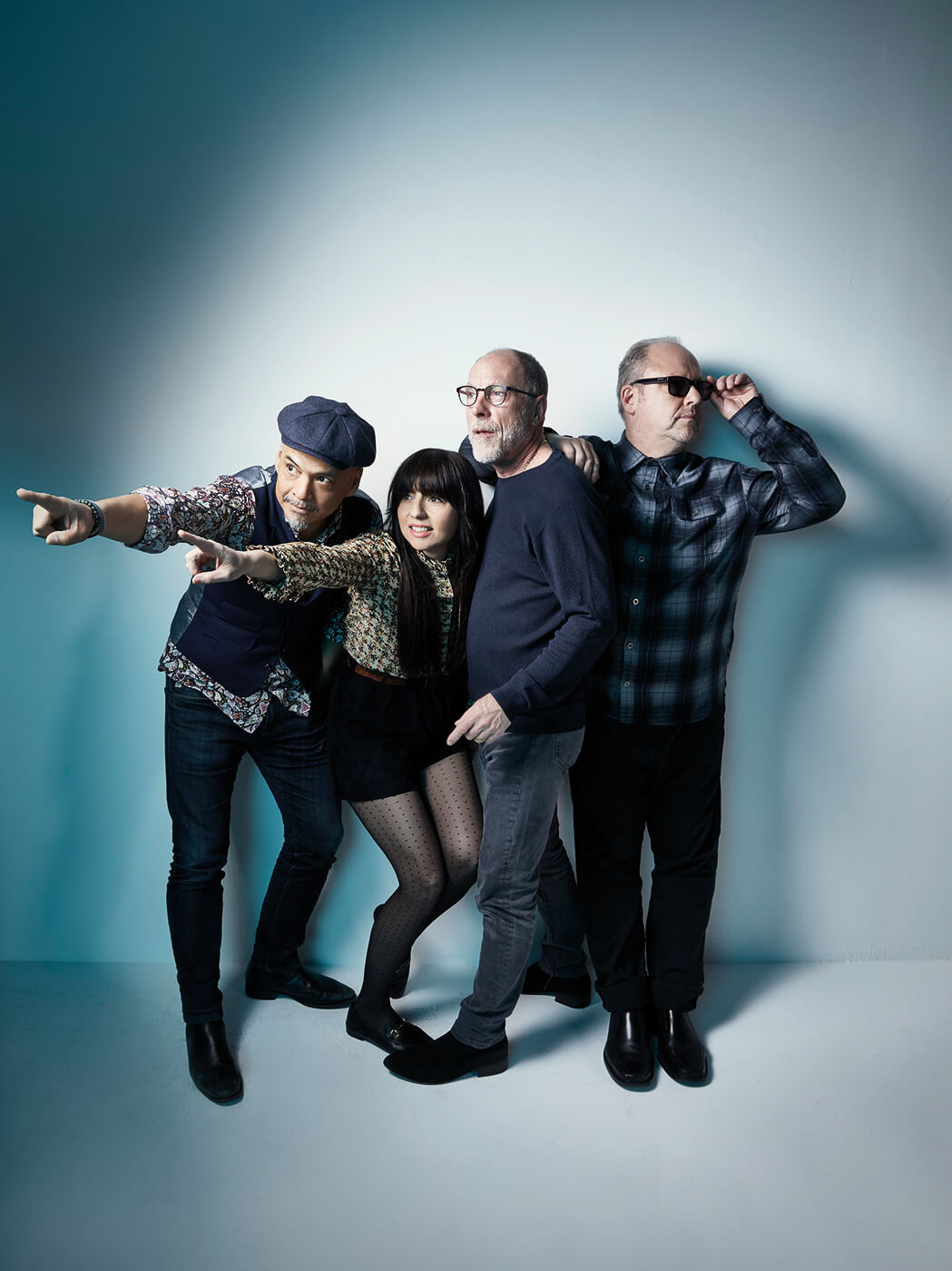
Teleman
Francis’s first encounter with a guitar was when he picked up the nylon-string acoustic owned by his mother at the age of 12 and from the very outset, he saw the guitar as something of a means to an end.
“It’s a tool of accompaniment if you’re a songwriter,” he explains. “For me personally, that’s what it’s for. Obviously, I’ve gotten better at having my own style or my own feel, so it’s not like I’m not into guitar playing. It’s just that it’s more about songwriting for me than it is the way that I’m going to play.
That said, while the way he’s going to play might not be something he’s too worried about, what he’s going to play clearly matters – Francis has rarely been seen without a Telecaster in his hands. His first, however – a Japanese-made Fender Contemporary Telecaster – was not exactly standard.
“It was kind of a heavy-metal guitar,” Francis reflects. “It had a whammy bar and locked tuning [nut]. I would just take all that stuff out to make it more basic, because I wasn’t that kind of a player. But you could get it for like 400 bucks and it was a real Fender guitar!”
Before long, Francis came to appreciate that Leo Fender’s first-born solidbody was uniquely well-suited to his guitar mindset.
“I learned over time that that the Telecaster has a short sustain and it’s bright, so it was very suitable for rhythm guitar for me,” he explains. “Then you start to notice, whether it’s Bruce Springsteen or Television – whoever picks up a Telecaster, you notice that it has value in its limitation. It leaves open some space for the guy who’s got the pedals and is playing the solos.”
Whoever picks up a Telecaster, you notice that it has value in its limitation. It leaves open some space for the guy who’s got the pedals
The ‘guy who’s got the pedals’ in Pixies has always been Joey Santiago. “He’s almost the keyboard player,” Francis explains of Joey’s role in the process. “He has to find the right thing without getting in the way of the song, or getting in the way of the singer.”
Does Black Francis ever wish that he was the guy doing the interesting and esoteric guitar stuff instead of holding down the rhythm?
“I get plenty of gratification in being the frontman,” he winks. “I think if I was just a rhythm-guitar player in a band, and I wasn’t singing… that might not be gratifying enough to my ego!”
True vintage
Given how he seemingly has little time for romance or sentiment when it comes to the process of making music, you’d expect Black Francis to be in the camp of guitarists who don’t really care what gear they’re playing, but in fact it’s the opposite. Francis likes his guitars old – be it one of his two 50s Teles, various golden-era Martins or an old Gibson SG.
“When I got to be able to afford to buy really nice vintage guitars, that’s what I gravitated toward! Now we’re all-vintage,” he says. “We’ve tried new guitars – if someone wants to give you a free guitar, it’s like, ‘It’s a free guitar, I gotta try this!’ But then it’s, ‘Oh… yeah, just give me the vintage one, please.’ It just never sounds as good.”
It’s not just about having nice old guitars for the sake of it, however. Francis has a theory about why vintage instruments are the better choice for him.
I noticed that I’m better when I have an older guitar…there’s more stuff for me to play around without even having to hardly play the thing!
“I think a lot of more ‘rough’ players probably get more of their tone from the gear,” he elaborates. “Whereas a very proficient ‘chops’ kind of player, a lot of their tone is coming from their technique. I noticed that especially in the country-music world. A lot of those guys, they don’t want or care about vintage guitars or amplifiers, because they don’t need them! They’re going to make it sing by the way that they play.
“When I first started working in Nashville, I noticed that. I was like, ‘I can’t believe Steve Cropper has like a Guitar Center guitar and a Guitar Center amp!’ And then you hear these guys playing, and it’s like, ‘Fuck! They don’t need anything else, they’ve already got it!’
“Whereas with someone like myself, who is less of a chops player, I noticed that I’m better when I have an older guitar. There’s more nuance and more overtones in the pickups coming through the amplifiers – there’s more stuff for me to play around without even having to hardly play the thing!”
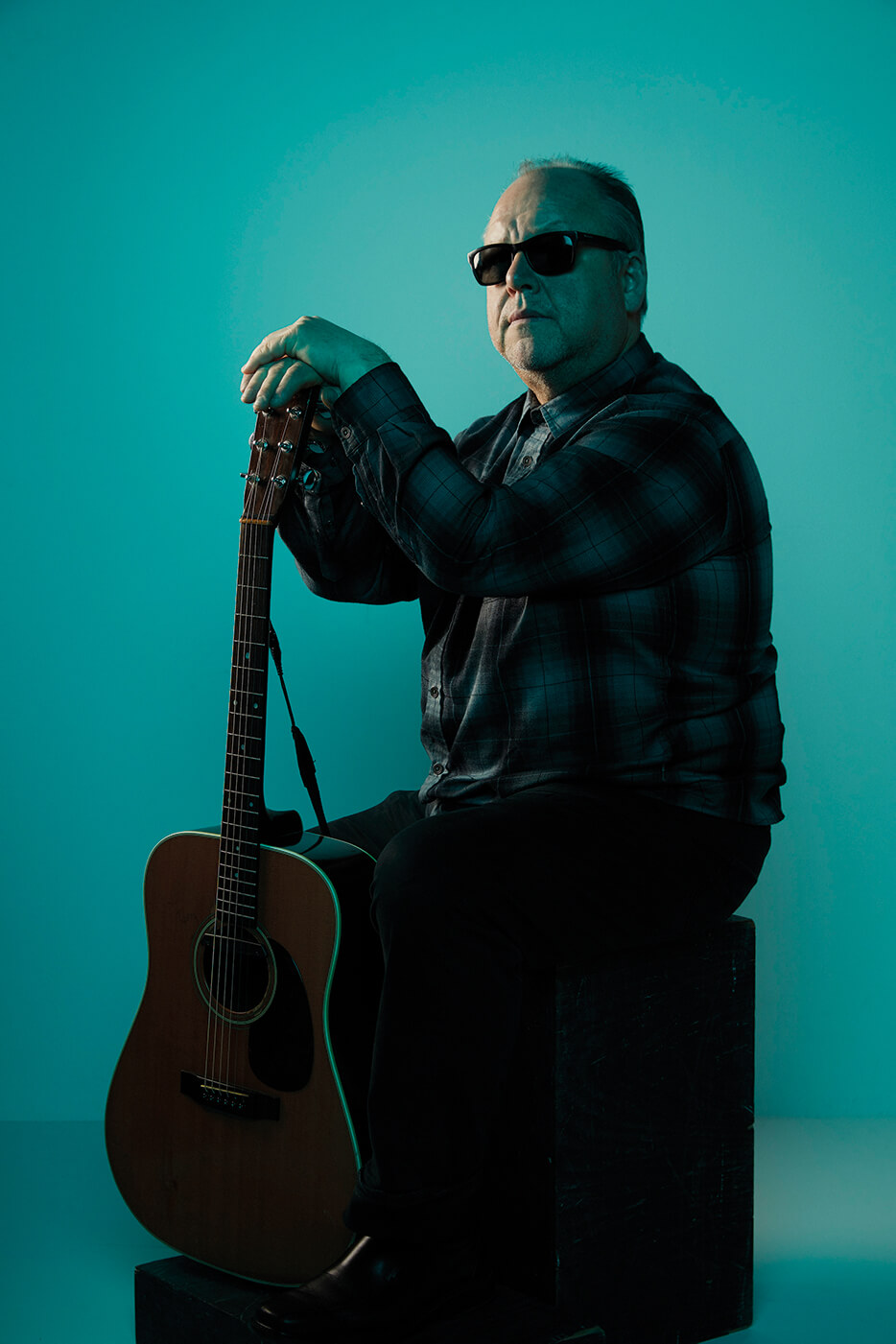
While his beloved Martin dreadnoughts mainly come from the 50s and 60s, however, there’s one that bucks the trend.
“I have one that I got in England that’s probably like a 1985 or something like that,” Francis tells us. “But now I’ve had for 25 years or whatever, and it’s been played-in a lot, I actually played better than I play my really vintage ones. Producers tend to like say, ‘Play that one, because you actually play it better!’”
Typically, while many guitarists would blanche at the notion of gigging old Martins, 50s Teles, old 1960s Vox AC30s and the like, Frank’s attitude to his gear sums his no-nonsense approach to being at the helm of one of the most important alternative rock bands ever.
“I bring all my vintage stuff with me on the road, I don’t treat them as museum pieces,” he insists. “I just play them until they break and when they break, I get them fixed. And if they can’t be fixed, then I just throw it away. I don’t care how much it’s worth, it’s just a piece of wood.”
Pixies’ Beneath The Eyrie is out 13 September 2019 on BMG.

